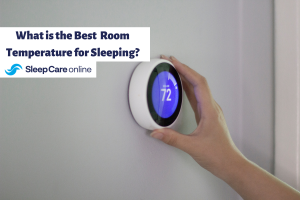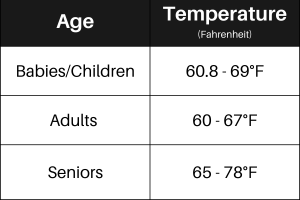Key Takeaways
- Bedroom temperature can play a key part in getting the proper amount of sleep you need. The temperature could vary based on age and other factors, mentioned below.
- Sleeping in a bedroom temperature that is too hot or too cold can disrupt a person’s comfort and time sleeping, and as a result, may affect their mood the next day.
- There are many ways to maintain the proper bedroom temperature to increase comfort and overall sleep quality.
The temperature of the room where you sleep can affect your sleep health overall. Body temperature goes down while a person sleeps, so having a cool room temperature will assist in maintaining a good and long sleep all night. As part of a healthy sleep routine, pay attention to the thermostat before going to bed. Room temperature can help with sleep problems and assist with prolonged sleep, free of interruptions, so you are well-rested in the morning.
 Does Your Body Temperature Change When You Sleep?
Does Your Body Temperature Change When You Sleep?
A person’s body temperature naturally declines as it gets closer to bedtime. That’s because body temperature follows a 24-hour cycle that is connected to the sleep-wake rhythm. The drop in temperature aids in better, more comfortable sleep. While sleeping, a person’s body temperature will drop 1-2 degrees lower than it is during the daytime.
How Does Temperature Affect Sleep?
One of the most important components that can affect sleep is the thermal environment. An unideal temperature, whether warmer or colder, increases the chances of a person waking up in the middle of the night, resulting in less REM and slow-wave sleep. The thermal environment’s effects on a person’s sleep stage affect how the body regulates sleep.
Sleep stages and their effects can actually be affected by which type of bedding a person uses or what type of clothing they wear. So, it is important to keep in mind what kind of sheets you use or clothing you wear as you are sleeping, as heat exposure can increase your chance of waking up at night, disrupting two very important stages of the sleep cycle.
What Happens if the Bedroom is Too Hot?
If the bedroom is too hot at night, that can certainly disrupt a person’s sleeping habits and it also affects their body clock. Sleeping in too hot of a bedroom negatively impacts cognitive function and may even cause someone to become ill because their circadian rhythm can be out of sync. After sleeping in too hot of a room, symptoms of feeling ill include:
- headache
- dehydration
- dry mouth
- sore throat
What Is the Ideal Room Temperature for Sleep Apnea Patients?
Sleep apnea patients already have challenges with peaceful sleep, so regulating room temperature is one of the manageable factors that can help promote healthy sleep. While it depends on personal comfort levels, ideally sleep apnea patients should set their bedroom thermostat near 65 degrees. A room temperature that is neither too hot nor too cold provides the ideal sleep environment. Some patients may find this setting much too cold. Setting the thermostat slightly higher is acceptable as long as it does not lead to a warm or stuffy room.
Does Ideal Room Temperature For Sleeping Change with Age
What is the Ideal Sleeping Temperature for Children?
Children and babies tend to be affected by room temperatures. That’s because they regulate the temperature of their heads, especially their faces. It is very important to make sure a baby’s room temperature is not too warm. Studies have shown that rooms that are too warm could lead to sudden infant death syndrome (SIDS).
It is recommended to keep a baby’s room between 60.8-68°F. Older kids’ rooms can be set between 64-69°F. If temperatures vary away from these recommended temperatures, it could affect their sleep.
What is the Ideal Sleeping Temperature for Adults?
An appropriate bedroom temperature for adults is around 65 degrees Fahrenheit (18.3 degrees Celsius). Most doctors will recommend keeping the thermostat set between 60-67 Fahrenheit (15.6 to 19.4 degrees Celsius) and varying on a person’s preferences.
Turning the thermostat down at night could help regulate and signal to a person’s body that it is time to fall asleep. That’s because bodies have a lower core temperature later in the evening.
What is the Ideal Sleeping Temperature for Seniors?
Seniors may have a slightly different experience of room temperature when they get ready for bed. Their thermostats may have to be adjusted higher than adults or children. Research has shown that the average and safe room temperature for older adults is around 78 degrees. To prevent an elderly adult from becoming too cold, it is recommended that the room temperature never falls below 65 degrees. While a cooler room is preferred, older adults may require a somewhat higher temperature for comfortable sleep.
How to Maintain Optimal Sleeping Temperature
Use a Fan to Circulate Cool Air
Ceiling fans are an excellent way to cool a singular bedroom without changing the thermostat temperature of the entire house. If you are sharing a home with people of different ages, controlling the thermostat can lead to uncomfortable sleeping conditions for some. Instead, set an ideal temperature for the whole house that meets most of the comfort levels of the occupants, and use a ceiling fan to circulate airflow and cool one room where you are sleeping.
Set the Thermostat Auto Mode
The temperature in a home can change dramatically throughout the day and night depending on the season and outside weather conditions. It can become a hassle re-setting the thermostat every time someone becomes too warm or too cold, especially at night. Set the thermostat to an automatic mode so that it self-regulates, adjusting to changing internal temperatures without manual intervention. Choose an ideal temperature that fits everyone’s comfort levels and leave it in that uniform setting.
Start to Cooldown During Your Bedtime Routine
Some pre-bedtime routines can help promote a cooler night’s sleep. Avoid hot beverages, like warm milk, which can help with sleep, but can also increase overall body temperature. Check the thermostat so that it is at an ideal temperature. Set your ceiling fan to a desirable speed that encourages airflow without making your room drafty. Avoid physical activities before bedtime that can leave you sweaty and warm. Calm yourself as you settle in. High emotions can raise body temperature.
Open Your Windows
Depending on the season and the weather, you may be able to open a bedroom window. The fresh night air is a sure cure for healthy sleep. On a cool night, it can be refreshing and even invigorating when you awake in the morning. Not all homes have the benefit of bedroom windows. Some outside environments may be noisy at night, like the city, which can disrupt sleep. Also, consider the safety of leaving a window open if you live in a first-floor dwelling.
Use Egyptian Cotton
Your choice of bedding can also help promote a cooler sleep. Some synthetic bedsheets can retain body sweat and leave you feeling warm and stuffy, even when the room is cool. Try Egyptian cotton bedding, which absorbs body moisture and helps you stay cool while you sleep.
Since Egyptian cotton is a more luxurious material, not only is it durable and soft, but it also does not pill or produce lint. It is much lighter than other types of cotton and gets better with each wash. Egyptian cotton actually becomes softer the more times it is washed and is perfect for all seasons. Its breathability is perfect for summer months, and its 600-thread count is ideal for insulation during the winter months.
Use Mattress Toppers, Cooling Pillows, and Sheets
Along with selecting cooler, cotton bed sheets, you can also look into other types of bedding to help you sleep cool. Try cooling pillows, which are designed to absorb heat and body moisture, so you never have that sweaty head feeling in the morning. Mattress toppers can also help absorb body heat and sweat, offering a more comfortable and cooler night’s rest. Look into any bedding options that may cost a little more but deliver a cooler sleeping experience.
What Other Factors Can Impact Your Sleep Besides Temperature?
Along with a cool room temperature, there are other things you can do to promote a good night’s sleep:
- Avoid alcohol and caffeine before bedtime
- Avoid blue light devices such as computers, phones, and TV as you near bedtime
- Try not to eat a heavy or greasy meal as you get close to going to bed
Are You Sleeping Enough?
Getting enough sleep every night is important for overall health. But how do you know if you are losing out on your sleep? Try the free sleep assessment to know if you are on the right track to a good night’s rest.






